Presidential Dollars Collection
The Presidential Dollar Designs
Struck in the same golden-colored composition as Sacagawea, Native American and American Innovation dollars, Presidential dollars of 2007-date feature obverse relief portraits of the U.S. presidents based on paintings, sculptures or photographs. Inscriptions on the obverses include the name of the president, order of service, and the years of presidency. Beginning in 2009, the obverses also feature the motto in god we trust, which is found on the edge of 2007-2008 issues.
The date, mint mark and motto e pluribus unum are inscribed upon the edge of all Presidential dollars, and when introduced in 2007, these were the first U.S. dollar coins in over 200 years to bear edge lettering. The common reverse features a relief rendition of the Statue of Liberty, the inscription united states of america in a protected area around the rim and the denomination stated as $1. The usual legend liberty is omitted from the coins, as the image of the Statue of Liberty on the reverse was considered a sufficient representation of freedom.

Presidential Dollar reverse design
Four U.S. presidents were honored each year in order of service, with the stipulation that a president must have been deceased for at least two years before issue of a coin bearing his likeness. Due to this, the series originally ended with the third 2016 issue honoring Ronald Reagan. It was resumed in 2020 to include George H.W. Bush, who died in 2018.
Obverse Designs
2007
- George Washington (1789-1797)
- After commanding the Continental Army during the Revolutionary War, Washington served as the first United States president.

- John Adams (1797-1801)
- The first vice president under George Washington, Adams served one term as president and established the Department of the Navy.

- Thomas Jefferson (1801-1809)
- Principal author of the Declaration of Independence, Jefferson doubled the size of the country with the 1803 Louisiana Purchase..

- James Madison (1809-1817)
- Dubbed the “Father of the Constitution” for his leading work on that great document, Madison led the nation during the War of 1812.

2008
- James Monroe (1817-1825)
- Fought in the Revolutionary War and, as president, formulated his Monroe Doctrine banning further colonization of the Western Hemisphere.

- John Quincy Adams (1825-1829)
- Son of the 2nd president, he finalized peace treaties with Creek tribes and supported establishment of the Smithsonian Institution.
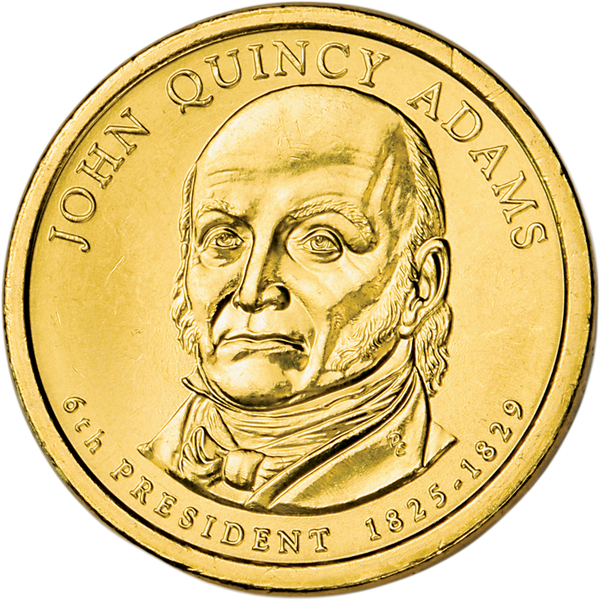
- Andrew Jackson (1829-1837)
- A war hero during the War of 1812, Jackson increased voter turnout and political influence of common people while president.

- Martin Van Buren (1837-1841)
- Established the two-party system, the party caucus and the nominating convention while serving as the 8th U.S. president.

2009
- William Henry Harrison (1841)
- Defeated Shawnee chief Tecumseh twice as a military general and served just 32 days as 9th president before dying of pneumonia.

- John Tyler (1841-1845)
- Becoming president when William Harrison died in office, Tyler ended the Second Seminole War and completed the annexation of Texas.

- James K. Polk (1845-1849)
- Successfully led the nation during the Mexican-American War and gained most of the present Southwest region of the country from Mexico.

- Zachary Taylor (1849-1850)
- A national hero of the Mexican-American War, Taylor served only 16 months as 12th U.S. president before dying in office of illness.

2010
- Millard Fillmore (1850-1853)
- Serving as vice president when Zachary Taylor died in office, Fillmore supported railroad expansion and trade with Japan as president.
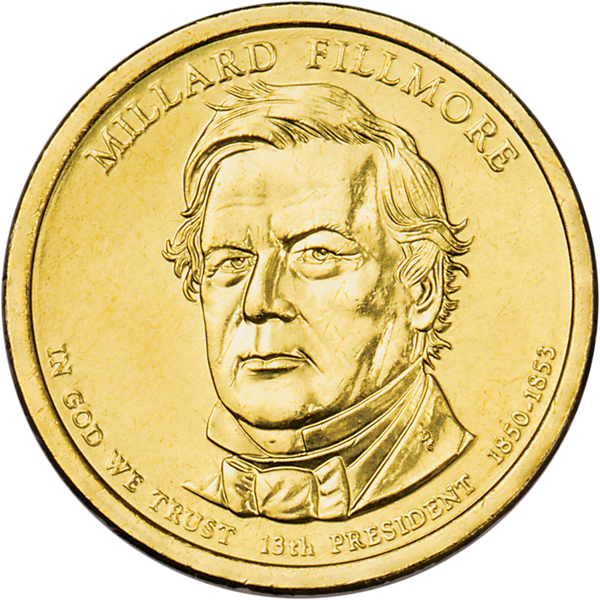
- Franklin Pierce (1853-1857)
- A general during the Mexican-American War, President Pierce completed the Gadsden Purchase of southern Arizona and New Mexico.

- James Buchanan (1857-1861)
- Seven southern states seceded from the Union and formed the Confederate States of America near the end of his one term as president.

- Abraham Lincoln (1861-1865)
- Led the Union through the Civil War and planned a conciliatory end to the war before his assassination during his second term in April 1865.
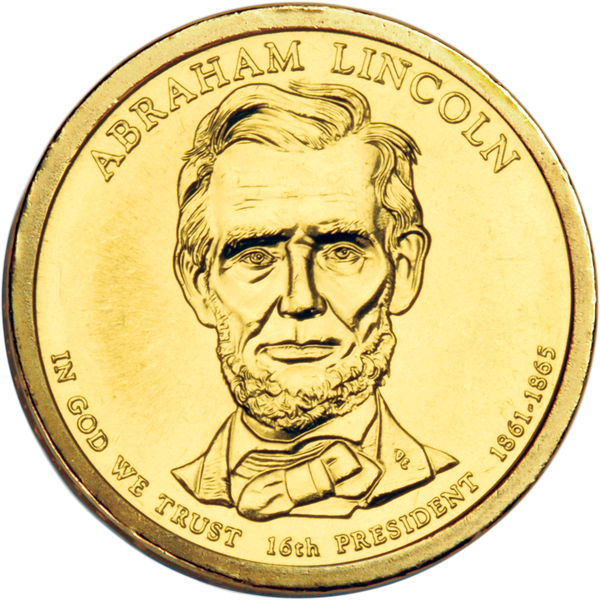
2011
- Andrew Johnson (1865-1869)
- Vice president when Lincoln was assassinated, Johnson was president during ratification of the Thirteenth Amendment abolishing slavery.

- Ulysses S. Grant (1869-1877)
- Commander of all Union forces during the Civil War, Grant fought inflation and reduced both taxes and the national debt as president.
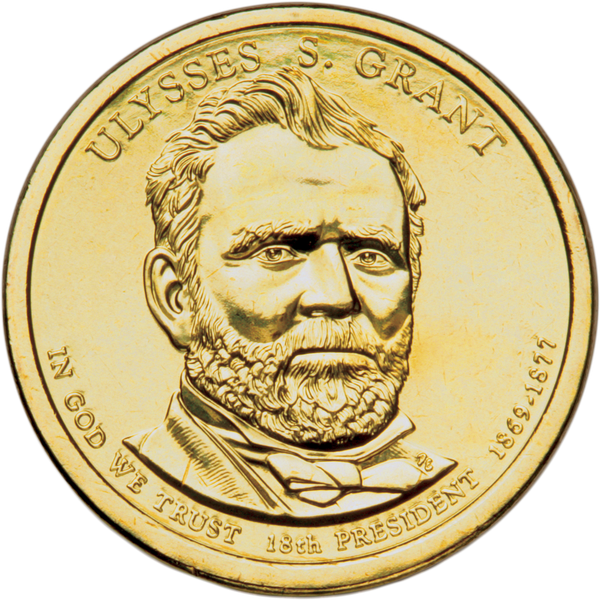
- Rutherford B. Hayes (1877-1881)
- Wounded five times as a Union officer during the Civil War, Hayes fostered friendship between the North and the South as president.
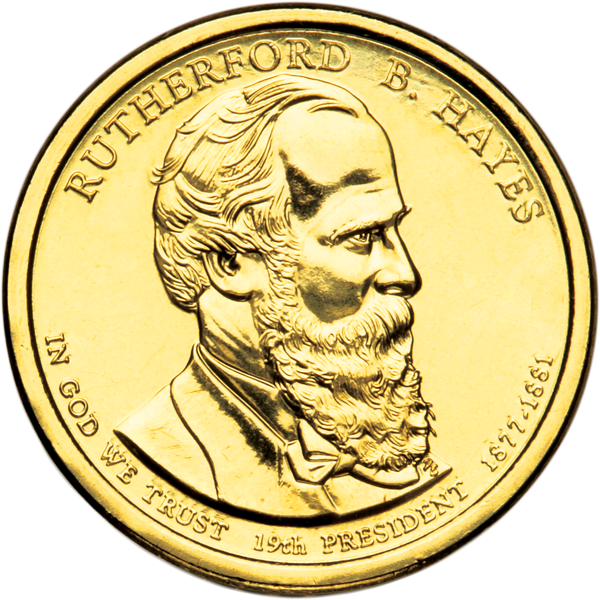
- James Garfield (1881)
- Working to reform civil service during his first year in office, Garfield was shot by an angry federal office seeker in July 1881 and died 80 days later.

2012
- Chester A. Arthur (1881-1885)
- Serving as vice president when Garfield died of gunshot wounds, Arthur reformed civil service and established territorial government in Alaska.

- Grover Cleveland (1885-1889)
- Made appointments based on merit rather than party, and helped enact the Interstate Commerce Commission to regulate the railroad industry.

- Benjamin Harrison (1889-1893)
- During his presidency, the Sherman Anti-Trust Act was signed into law to fight monopolies and six northwestern states joined the Union.

- Grover Cleveland (1893-1897)
- The only U.S. president to serve two non-consecutive terms, Cleveland was president both before and after Benjamin Harrison's single term.

2013
- William McKinley (1897-1901)
- During his presidency, the United States won the Spanish-American War and received Puerto Rico, Guam and the Philippines in the aftermath.

- Theodore Roosevelt (1901-1909)
- Fought against monopolies, acquired the Panama Canal Zone and added more than 125 million acres to the national forest system.

- William Howard Taft (1909-1913)
- Strengthened the Interstate Commerce Commission and supported economic development in Latin America and Asia through “Dollar Diplomacy.”

- Woodrow Wilson (1913-1921)
- Led the nation through WWI, signed the Federal Reserve Act and supported the 19th Amendment granting women the right to vote.

2014
- Warren G. Harding (1921-1923)
- Signed the treaty formally ending WWI and cleaned up corruption at the Veterans Bureau. He died in office of a heart attack on August 2, 1923.

- Calvin Coolidge (1923-1929)
- Reduced the national debt, exposed numerous scandals of the Harding Administration and restored the prestige and dignity of the presidency.

- Herbert Hoover (1929-1933)
- When the stock market crashed and the Great Depression began during his presidency, Hoover was blamed for much of the economic malaise.

- Franklin D. Roosevelt (1933-1945)
- Leading the nation through the Great Depression and WWII until his death in 1945, FDR was the only president to serve more than two terms.

2015
- Harry S. Truman (1945-1953)
- Helped rebuild Europe after WWII with his Truman Doctrine and the Marshall Plan, and signed the North Atlantic Treaty that created NATO.

- Dwight D. Eisenhower (1953-1961)
- Resolved the Korean War, established protection for nations from Communist aggression and enforced public school integration.

- John F. Kennedy (1961-1963)
- Forced the removal of nuclear missiles from Cuba, established the Peace Corps and signed a nuclear test ban treaty before his assassination in 1963.

- Lyndon B. Johnson (1963-1969)
- Signed the 1964 Civil Rights Act and 1965 Voting Rights Act, worked to establish Medicare and supported equal opportunity in education.

2016
- Richard M. Nixon (1969-1974)
- Secured arms control agreements with the Soviet Union and opened diplomatic channels with China before resigning in the aftermath of Watergate.

- Gerald R. Ford (1974-1977)
- Became president upon resignation of Richard Nixon, whom he pardoned for Watergate indiscretions, and offered clemency to Vietnam War draft evaders.

- Ronald Reagan (1981-1989)
- Reduced nuclear arms and ended the Cold War with the Soviet Union, while his domestic policies including tax cuts fueled a lengthy economic boom.

2020
- George H.W. Bush (1990-1993)
- Assembled a multinational force to liberate Kuwait from Iraq, promoted volunteerism and signed into law the Americans with Disabilities Act and the Clean Air Act.


